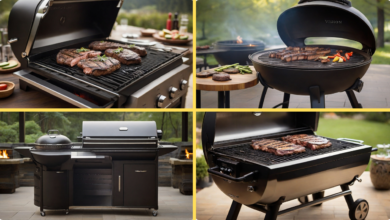5 Tips for Cleaning Your Weber Grill: A Personal Story and Expert Advice [Keyword: Weber Grill Cleaning]
![5 Tips for Cleaning Your Weber Grill: A Personal Story and Expert Advice [Keyword: Weber Grill Cleaning] 1](https://thegrillshopboyertown.com/wp-content/uploads/2023/04/tamlier_unsplash_5-Tips-for-Cleaning-Your-Weber-Grill-3A-A-Personal-Story-and-Expert-Advice--5BKeyword-3A-Weber-Grill-Cleaning-5D_1682303201.webp)
What Is Cleaning the Weber Grill?
Cleaning the Weber grill is an essential task that must be done regularly to maintain its efficiency and durability. It involves removing grease, food particles, ash, and other debris from the grates and inner components of the grill.
To clean a Weber grill properly, it should be cooled down before cleaning begins. Removing stuck-on food particles using a brush or scraper and then wiping down any remaining residue with towels or sponges are crucial steps in this process. Lastly, checking for rust damage on various parts like wheels, firebox etc., will prevent future problems.
Regular maintenance helps extend your Weber’s life expectancy – so don’t neglect cleaning after each use or every couple months!
Frequently Asked Questions About Cleaning Your Weber Grill
When it comes to grilling, there’s nothing quite like a trusty Weber grill. With its sturdy construction and exceptional cooking capabilities, it’s no wonder that homeowners everywhere have come to rely on their Weber grills for perfectly cooked meals year after year.
But as with any outdoor appliance, maintenance is key to ensuring your Weber grill stays in top shape for the long haul. That means keeping it clean – but cleaning your grill can be easier said than done.
To help answer some of the most common questions about cleaning your Weber grill, we’ve rounded up this FAQ.
1. How often should I clean my Weber grill?
Ideally, you should give your grill a thorough cleaning after each use. But at the very least, aim to deep clean every few months or before storing away for winter.
2. What tools do I need to properly clean my Weber grill?
A steel bristle brush (although not recommended by all manufacturers), gloves, paper towels or old rags are generally enough – although there are more convenient tools nowadays such as specialized cleaning sprays and brushes made specifically for certain parts of the machine.
3. Do I need to remove the grates from my Weber Grill when cleaning?
Yes! Removing these components ensures that all grease buildup and food residue on top of them will be thoroughly cleaned in order to avoid post-cooking fires and blocked flues
4. Can I use soap or dishwashing detergent on my Weber Grill grates?
It’s better if you don’t . Dishwashing detergents might leave traces after washing which could react negatively with heat intensities while using.. It may also stick around even after rinsing making next usage dangerous!
5. Can wire-bristled brushes cause health hazards?
While steel-bristled-brushes outlast traditional-fashioned cartridges meant specifically labelled ‘grill-cleaning products,’ they pose fatal threats; metal flakes get lodged in meat upon ingestion leading to serious gastrointestinal problems.
6. Does scrubbing grates with tinfoil really work?
Yes! This method of cleaning is effective, especially for those who don’t have access to any or all specialized cleaners and tools specifically manufactured to clean different parts of the grill – it’s even advisable to oil up your grate before using wax paper in order not scrub too hard as this could inevitably remove seasoning from that particular component.
7. Should I use my Weber Grill while it has grease buildup inside or exuding around its interior?
No! Highly flammable flames may run throughout excess grease when ignited predisposing you, your loved ones, guests and property at risk!
By taking care of your Weber grill properly through regular maintenance and cleaning – including following the tips above – you can ensure that delicious grilled meals will be a staple in your home for years to come.
Top 5 Myths and Facts About Cleaning Your Weber Grill
Summer is here, and it’s time to fire up the grill! Whether you’re a pro at grilling or just starting out, one thing we can all agree on is that cleaning your Weber grill is essential. Not only does it help keep your food tasting great and prevent rust, but it also prolongs the life of your grill. Unfortunately, there are many misconceptions surrounding how to properly clean your Weber grill. In this blog post, we’ll debunk the top 5 myths about cleaning your Weber grill and give you some tried-and-true facts.
Myth #1: You should use steel wool to clean your stainless steel grates.
Many people believe that using steel wool is necessary for removing tough stains on their stainless steel grates. However, using steel wool can actually scratch and damage the surface of the grate over time. Instead, try using a nylon brush or scraper specifically designed for grills.
Fact #1: Use a nylon brush or scraper.
While steel wool may seem like an effective tool to remove stuck-on food particles from your Weber grill grate; however plastic bristle brushes have been shown to be just as efficient in cleaning without damaging surfaces
Myth #2: The self-cleaning function will do all of the work for you.
Don’t be fooled by the term “self-cleaning.” While some newer models of Weber grills come equipped with this function, it isn’t a miracle worker. In fact ,they burn off residual grease leftover – which leads us into Fact#2!
Fact #2: Scrape off excess residue before turning on self-cleaning function
Before activating any manufacturer-installed self-clean functions ensure any residual grease has already been scraped away so that way someone doesn’t get injured attempting remove buildup after something gets caught in-between surfaces while hot
Myth #3: Baking soda and vinegar will magically transform dirty parts sparkling new
Baking soda & vinegar may be great for cleaning other items, but they are not the best options when it comes to your Weber grill. Using them will leave behind residue that is hard to get rid of and does nothing in preventing rust or protecting surfaces.
Fact #3: Use a specialized cleaner
To protect your Weber grill surface from rusting , use specially formulated cleaners specifically meant for grills. Save household Baking soda & vinegar to clean porcelain or pieces that aren’t as high maintenance.
Myth#4: You don’t need to cover your Weber grill after each use.
This myth couldn’t be any more further from the truth! Protecting the array on surfaces exposed externally too often leads those parts out in harsh summer environments like dirt or pests overtime and can lead into starting harder cleaning proceses earlier than needed
Fact#4: The importance of covering
Weber grills are designed with protective coatings, but fully utilizing their capabilities requires taking extra precautions such as adding covers so outdoor elements don’t make unwanted messes inside over time.
Myth#5 : Once you’ve cleaned every component of your Grill People believe since their Grill is spotless over once these parts have been cleaned individually there isn’t anything else left needing attention .
Fact #5: Deep Clean Tips
A yearly check-up also involves deep-cleaning (sound similar?). If you’re prone seasonal changes, take it outdoors remove all detachable portions altogether reevaluate how things stand up at this point!
Cleaning a Weber Grill can seem financially heavy if upkeep isn‘t observed everyday… really though It doesn’t have to cause stressful angst – by following these efficient tips debunking myths related maintaining a pristine grilling experience forthcoming while ensuring its longevity easily becomes doable.
Tips for Maintaining a Clean Weber Grill All Summer Long
There is nothing better than firing up the old Weber grill on a hot summer day and cooking up delicious burgers, steaks, and kebabs. However, if you want to ensure that your grilling season runs smoothly, it’s important to make sure that your grill stays in tip-top condition. This means regular cleaning and maintenance throughout the summer.
So what are some tips for maintaining a clean Weber grill all summer long? Here are some handy suggestions to help keep your outdoor cooking machine working like new:
1. Clean out the Ash Catcher: The ash catcher is at the bottom of most Weber grills and collects any ashes that fall through from the charcoal or wood chips used as fuel. Make sure to empty this after every grilling session so there’s enough space for future use without making more mess.
2. Brush Away Debris After Each Use: Before putting away your Weber grill each night following food preparation sessions , add extra time using a wire brush across its surface area where debris such as excess grease has accumulated during previous uses.
3. Burn off Excess Grease: For easy removal of hard-to-clean grease build-up, simply fire up your BBQ with all burners turned to high heat for around 10-15 minutes until flames die down completely before brushing/coating everything else evenly (use vegetable oil!).
4. Keep It Covered:wWhen not in use – rain or shine – store covered properly with either custom-fitted cover suggested by marketing/promotional material itself OR something basic yet functional such as tarp-like materials which don’t let water seep into parts very easily
5.Support Webber Grills’ Cleaning Products:The brand only offers their own specific cleaners made exclusively for their products intended surfaces; however alternatives exist should you require other options/actions taken too while preserving valuable warranty.
These simple steps will help preserve the life span of your precious backyard BBQ machinery well beyond its original warranty period–keeping it in top condition for years to come! Happy Grilling, Chef!
The Dos and Don’ts of Cleaning Your Weber Grill
It’s almost grilling season, and if you’re anything like us, you’ve probably been itching to fire up your Weber grill for some delicious barbecue. But before you start cooking those steaks and burgers, there are a few things you need to know about cleaning your grill. Cleaning is an essential part of maintaining your Weber grill in tip-top condition so that it lasts as long as possible. In this blog post, we’ll take a look at the dos and don’ts of cleaning a Weber grill.
Do: Clean Your Grill After Every Use
The first thing that every Weber owner needs to know about their grill is that it should be cleaned after each use. This not only keeps the inside of the grill free from bacteria but also ensures that any leftover sauce or marinade doesn’t cause flare-ups during the next cookout.
Don’t: Leave The Ashes Inside The Grill
One mistake many people make when cleaning their charcoal Weber grills is leaving ashes inside instead of removing them after use. These ashes can quickly build up and reduce airflow through the vents resulting in inconsistent heating which spoils food quality—the ideal way to clean your charcoal grill is by using ash-cleaning tools rather than water because hot coals react with moisture (water).
Do: Preheat And Scrub Your Grates Before Cooking
Preheating helps burn off any remaining debris stuck on the cooking grates ensuring safe consumption while scrubbing eliminates all materials tightly adhering on wire racks such as cooked barbecue sauces or marinades—nothing ruins good meat like having bits sticking under it!
Don’t: Overuse Steel Wool Or Brillo Pads On Metals
Although steel wool pads work great below enameled paints, they damage uncoated metal thus reducing its lifespan over time—a soft-bristled brush does wonders!
Do: Brush Off Grease From Parts Like Drip Trays And Flavorizers
Anything left unchecked will accumulate outside or inside the grill resulting in barbecuing becoming a negative experience; hence, regularly scrub off all grease settled on drip trays or flavorizers to avoid building up over time.
Don’t: Use Oven Cleaners
Grilling is different from baking, so traditional oven cleaners shouldn’t be used for Weber grills. Instead, opt for mild soap and water or specialized cleaning products that are designed explicitly for such equipment, leaving them spotlessly clean without pits or scratches.
In conclusion, proper care ensures longevity of your prized possession – the Weber grill – thus making it last through many cookouts by getting rid of any stuck-on debris and wiping excess oils with high-quality cloths while enhancing productivity with safe cleaning techniques during each use without an additional cost required which could have been saved if only cleaning was taken seriously!
Expert Advice for Deep-Cleaning Your Weber Grill
As summer approaches, many of us start to think about firing up our trusty Weber grill and enjoying some delicious outdoor cooking. However, before you get too excited about your next backyard barbeque, it’s important to give your grill a thorough deep-cleaning. This not only ensures that your food will taste great but also helps extend the life of your grill.
Here are some expert tips for deep-cleaning your Weber Grill:
1. Start with a Safety Check
Before you begin cleaning, make sure that both propane tanks or natural gas line are turned off and disconnected. If using charcoal ignite briquets in a chimney starter instead of lighter fluid which leaves an unpleasant chemical residue on the inside surface of metal grates.
2. Remove Grates and Burners
Start by removing the cooking grates from the grill as well as all burners and heat plates/spreaders.This allows easier access while scrubbing interior surfaces at various points throughout this process. If rusty or deteriorated parts must be replaced do so .For example if honeycomb shaped Vaporizor Bars show signs of degradation replace them .This is ultimately safer than running burnt-out functions repeatedly until they eventually fail permanently,your flame may fluctuate falsely leading to somewhat lower temperature gauging
3.Clean Cooking Surfaces
Using warm water mix in dish soap,pulp half lemon over cloth wiping grate then rinse thoroughly(not dripping).Taking steps like these can brighten ,protecting against rust formation . Stubborn grease spots can often-times be removed when hot ; simply repeat same treatment once more.proving successful -remove excess residues whilst BBQ griddle still got temp other spotted areas maybe hotter just ahead after blotted any extra solution with dry paper towels .
4.Remove Entire Firebox
Next remove (Jot down model number + date manufactured determine procedures)the fire box or container especially made for holding fuel emanating Heat sources underneath stainless steel tubes ,if applicable being extra cautious of gas lines &hoses from adding charcoals then re-pack it. If incinerating briquettes again use Chimney start up,place media in middle,taking care to not overfill as these moving components gradually burn out or wear down without vigilant maintenance
5.Venturi Tubes Conditions
Inspect the Venturi tubes and valve assemblies.Choose appropriate brush head size ensuring passage thro’ inlet/outlet exhaust opening and push through.If you experienced clogged venturis which result in Gas grill won’t heat check manual instructions for model cleaning figures any blockages using tiny copper/steel brushes.
6.Clean Up
The final step is to clean up your workspace by wiping down all exterior surfaces, including the top lid where smoke may accumulate ,alongside handles,petrol hoses,magnets holding grills secure etc with a dry cloth .When finished dispose of paper towels properly,inexpensive foam plush gloves making prep time quicker .
There you have it! By following these tips, you’ll be able to deep-clean your Weber grill like a pro And get ready for amazing culinary adventures that await ahead
Weber grills are the epitome of outdoor cooking appliances, producing some of the most iconic and delicious meals worldwide. These grills have earned their reputation for remaining reliable in all weather conditions, enduring intense heat while simultaneously providing flavors that just can’t be obtained indoors from other kitchen equipment.
Though these built-to-last products are sturdy and durable by design, they still require maintenance if you want your love-affair with your Weber grill to continue over time. Regular upkeep guarantees a longer lifespan for your grill, so taking care of its cleanliness is essential — especially since no one wants bits of last week’s burgers blending into this week’s meal!
Dirty Grills Can Cause Mishaps
A dirty grill isn’t only unhygienic; it also poses safety risks when cooking food. Built-up grease on burners or inside hoods could ignite quickly due to high temperatures during cookouts. Additionally, debris interfering with flow regulators means that not enough gas passes through creating fires that get out of control even before cooking begins! Choking smoke plumes being produced because air control vents become clogged mean respiratory problems flare up among guests which mar winter gatherings.
Proper Maintenance Enhances BBQexperience
Cleaning shouldn’t be seen as a chore; indeed enhancing air circulation lets heats spread uniformly across the entire substrate area enabling even precise temperature-cooking perfection – whether veggies needing low temp/highest moisture till done or crispy-seared meat pieces cooked lightning-fast upon contact surfaces reaching desired doneness levels at once without any pesky hotspots tripping them up before achieving their potential!
Difficulty maintaining consistent heat negatively impacts both meat’s texture/taste quality while significantly reducing fuel efficiency leading more wastage and higher bills – which ultimately diminishes pleasure in preparation n’ serving fave foods’ outdoorsy goodness meaning that even if entertaining guests, there might be shorter stays with less enthusiasm/joy because the core attraction – deliciously smoked/grilled meat isn’t quite up to par.
Regular Cleaning Saves You Money!
Lack of proper maintenance leads to clogging valves and burners by grease and food debris. In turn, this negatively affects grilling performance leading to reduced lifespan; which further translates into a costly replacement cycle every few years instead of making full use of long-lasting equipment investments well into the future! Investing in weekly deeps cleans afterevey session makes sure your Weber grill is in tip-top shape & giving you value for money!
Final verdict
Cleaning regularly provides benefits ranging from safety assurance as high temperatures oxidize fragmented leftover fats stuck on surfaces causing flare-ups/ smoke hazards/& more — reducing efficiency significantly without regular cleaning using correct cleaners /removing everything promptly before winterizing it all away till next season looking out for metal rust & oil-based gunning problems … So take note: Regular maintenance holds key longevity-not just quality fun cooking experience- #GrillOn!!
Table with useful data:
| Cleaning Tool/Ingredient | Purpose |
|---|---|
| Grill Brush | To remove loose debris and burnt-on food |
| Scrubbing Pad or Steel Wool | To remove stubborn stains and build-up |
| Warm Water | To rinse off debris |
| Dish Soap | To break up grease and grime |
| Vinegar | To neutralize odors and disinfect the grill |
| Baking Soda | To create a paste for tough stuck-on messes |
Information from an expert
Cleaning your Weber grill is essential for maintaining its longevity and ensuring that you get the best grilling experience possible. Start by brushing off any remaining food particles with a wire brush after each use. For tough stains, use warm soapy water and a non-abrasive cleaner to scrub the grates clean. You can also remove the grates entirely and soak them in hot water before cleaning to loosen up any stuck-on grime. Always remember to wipe down the exterior of your grill as well, but never use abrasive cleaners or steel wool on the finish! By keeping up with regular maintenance cleaning, you’ll be able to keep your Weber grill looking great and performing beautifully every time you cook.
Historical fact:
Cleaning the Weber grill has been a common practice since its invention in 1951, when George Stephen Sr. created the iconic kettle-shaped barbecue for his family’s backyard cookouts. Over the years, cleaning techniques have evolved with advancements in technology and materials, but the importance of maintaining hygiene and preventing rust on this beloved cooking apparatus remains a vital aspect of grilling culture today.



